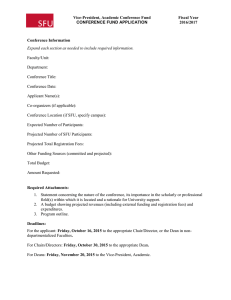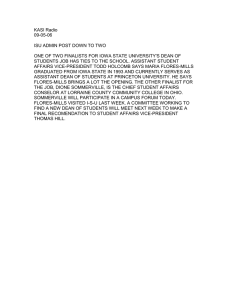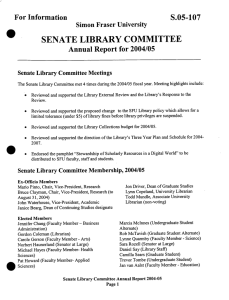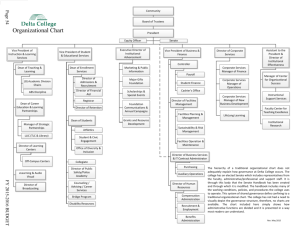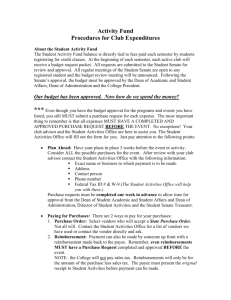S.13-99 SFU
advertisement
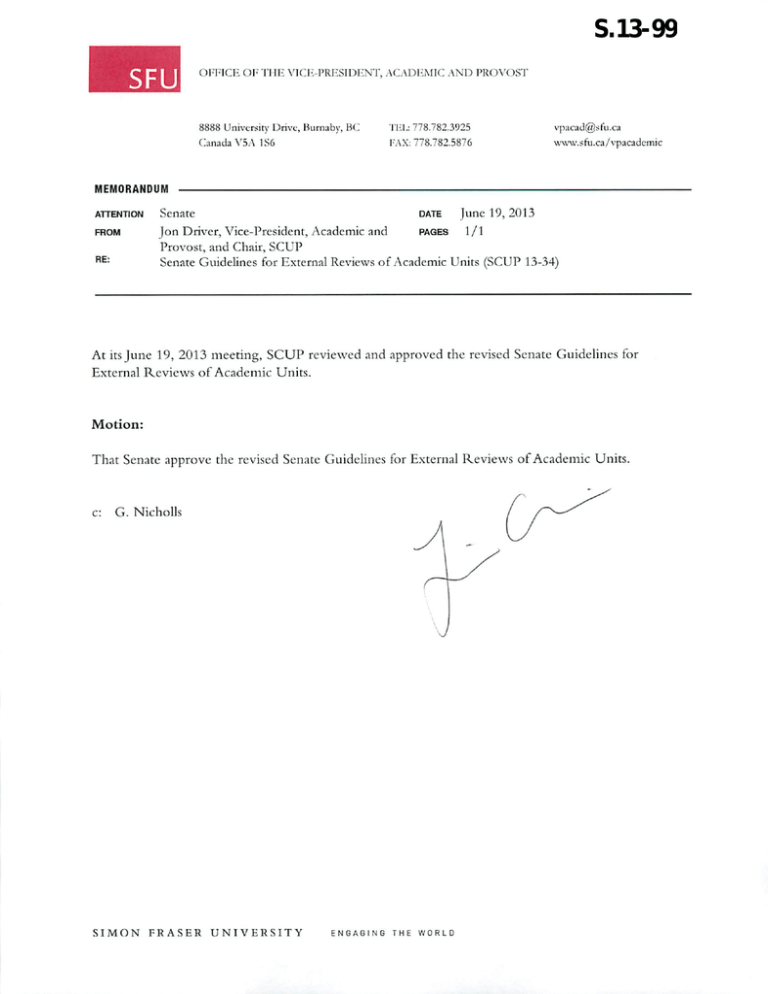
S.13-99 SFU OFFICE OF THE VICE-PRESIDENT. ACADEMIC AND PROVOST University Drive, Burnaby, BC Canada V5A 1S6 TEL: 778.782.3925 vpacad@sfu.ca FAX: 778.782.5876 www.sfu.ca/vpacademic MEMORANDUM attention from Senate |on Driver, Vice-President, Academic and date pages June 19,2013 1/1 RE: Senate Guidelines for External Reviews of Academic Units (SCUP 13-34) Provost, and Chair, SCUP At itsJune 19, 2013 meeting, SCUP reviewed and approved the revised Senate Guidelines for External Reviews of Academic Units. Motion: That Senate approve the revised Senate Guidelines for External Reviews of Academic Units. c: G. Nicholls SIMON PHASES UNIVERSITY engaging the world SCUP 13-34 SFU OFFICE OF THE VICE-PRESIDENT, ACADEMIC AND PROVOST University Drive, Burnaby, BC Canada V5A 1S6 TEL: 778.782.3925 FAX: 778.782.5876 vpacad@sfu.ca www.sru.ca/vpacademic MEMORANDUM attention from SCUP Jon Driver, Vice-President, Academic and date June 12,2013 pages 1/1 RE: Senate Guidelines for External Reviews of Academic Units Provost, and Chair, SCUP Attached are the revised Senate Guidelines for External Reviews of Academic Units. The last revision of the guidelines was in May 2000. In addition to minor edits, points have been added to Section 3.2 Unit Self-Study regarding the Senate-approved requirement for the inclusion of educational goals and evaluation of goals as part of the external review process. These revised guidelines will take effect upon approval by Senate. Motion: That SCUP approve and recommend to Senate the revised Senate Guidelines for External Reviews of Academic Units. SIMON FRASER UNIVERSITY ENGAGING THE WORLD SFU SIMON ENGAGING FRASER THE UNIVERSITY WORLD Senate Guidelines for External Reviews of Academic Units 1. Review Cycle: All academic units1 are reviewed on a periodic basis, normally once every seven years. The purpose of such reviews is to enable units to conduct their own assessments of their strengths and weaknesses, to obtain the views of external experts in the field, and to support academic planning. 2. Review Purpose: The review process is intended to ensure that: (a) The quality of the unit's programs is high and there are measures in place to ensure the evaluation and revision of the teaching programs. (b) The quality of faculty research is high and faculty collaboration and interaction provides a stimulating academic environment. (c) Unit members participate in the administration of the unit and take an active role in the dissemination of knowledge. (d) The unit's environment is conducive to the attainment of the objectives of the unit. Review committees should make their assessments taking into account the resources currently available to the unit and the University. 3. Review Process: 3.1 Initiation: The review will be initiated by the Vice-President, Academic, after consultation with the Dean of the Faculty and the unit involved. The Dean of Graduate Studies shall be involved in external reviews in relation to graduate programs and graduate student issues. i External reviews are normally conducted for Departments, Schools and non-departmentalized Faculties. However, some programs without department-equivalent status (e.g., Cognitive Science) are also reviewed on a regular basis. Units will be informed of impending reviews at least one year before the site visit by external reviewers. SCUP and Senate will be informed of the units scheduled for review prior to the start of the academic year in which reviews occur. The dates of the external review committee visit and a detailed schedule for the visit will be arranged by the VicePresident, Academic in consultation with the Dean and the unit. The Vice-President, Academic will prepare the terms of reference for the review committee in consultation with the Vice-President, Research, the Dean of the Faculty, the Dean of Graduate Studies and the unit. 3.2 Unit Self-Study: The unit will engage in a period of self-study of one to two semesters, possibly including a retreat, during which its members shall consider all aspects of the activities included in its academic plan and will prepare a report covering the following areas: a. Institutional role, unit role and activities, goals and aspirations; b. A statement of educational goals for each academic program2 (commencing with reviews in the spring term of 2014); c. An evaluation of the success of the unit in meeting the educational goals of its program(s), using methods and evidence selected by the academic unit (commencing with reviews scheduled for spring term of 2015). The evaluation should include evidence for student demand, access to courses, quality of teaching, educational experiences (including co-op and exchange opportunities), student academic achievement, scholarships and awards, student opinions of courses and programs, degrees and other credentials completed, student experience and satisfaction following graduation; d. Quality ofscholarship demonstrated through grants, graduate student achievements, knowledge mobilization (including publication, patents, applications and impact on communities), awards, citations, honours, and appointments; e. Service to the community demonstrated by public service activity, involvement in related community groups, membership on boards or similar bodies; f. Collegial environment for all members (faculty, staffand students) of the unit; g. Appropriate orientation and training, support for all employee development; h. Resources for unit activities: faculty, staff, operating budget, space, equipment and library holdings (including the process for determining collection strategies); i. Planning for the renewal of the unit's faculty members. Definition of Program; Minor, Major, Master and Doctorate The self-study shall include, at minimum, a standard set of data provided by the Office of the Vice-President, Academic (Academic Information Report and the Five-Year Historical Research Funding Report). The unit may supplement this if it so wishes. The unit's most recent Academic Plan must also be forwarded to the external review committee. The self-study report prepared by the unit shall be made available to all members of the unit (faculty, staff and students) prior to being forwarded to the external review committee. 3.3 Student Involvement: Undergraduate and graduate students shall be encouraged to participate in the preparation of material for the unit self-study and student input will be sought throughout the process. Student contributions will be included or reflected in the selfstudy. The Chair/Director/Dean should contact the student unions (undergraduate and graduate) and student representatives on unit committees, as well as publicizing the review in classes and within the unit. The students will have meetings with the external review committee. 3.4 Review Committee: The external review committee normally will consist of three persons external to the university who are senior members of the discipline, some of whom have had administrative experience. The unit will be asked to provide the Vice-President, Academic with a list of reviewers who represent a broad cross-section of the discipline and who are considered to be outstanding faculty members and objective reviewers. The Vice-President, Academic shall appoint the members of the external review committee. The external review committee will primarily be composed of faculty members from Canadian universities outside British Columbia and from universities in the USA where necessary. Both genders will be represented on the committee. The Vice-President, Academic will also appoint an internal member from the University community who will be a member of the committee and who will provide the review committee with contextual advice about the environment and operations of Simon Fraser University but not be involved in the authoring of the report. The site visit, which could be two or three days in length, will be co-ordinated by the Vice President, Academic. The Vice President, Academic and the Dean will meet with the review committee at the start of the visit to discuss guidelines for the review and the preparation of the report. The committee will also meet with the unit's faculty and staff members, graduate and undergraduate students, as well as with others with responsibilities affecting the unit. Members of the external review committee should avoid informal social events with members of the unit during the site visit. Where the unit under review has strong connections to other units at SFU, the Dean/Chair or Director of that cognate unit may request an interview with the review committee. A written and signed confidential submission to the review committee may be made by any individual or group of individuals who are unable to meet with the reviewers during the site visit. Information or allegations regarding specific individuals received by the review committee will be transmitted to the Vice-President, Academic and handled in accordance with established University procedures. If the review committee receives general comments or complaints that the environment in the unit is not conducive to a high quality of teaching, learning, research and working, the committee may comment and make recommendations on this in its report or may take the issue up privately with the Vice-President, Academic. At the conclusion of its visit and within 6 weeks, the review committee will submit a detailed report, including a full and frank assessment of the unit's mission, its various activities, the quality of the unit and its programs, and the resource allocations to and within the unit as well as any issues identified in the Terms of Reference. The report of the review committee will be a public document. Any supplementary reports concerning confidential matters will not form part of the public record but will be made available to the appropriate University officers. Any individuals named will be apprised of the information and provided with an opportunity to comment. 4. Developing an Action Plan: The External Review Report will be submitted to the Vice President, Academic and circulated to the: (a) unit involved (including faculty, staffand students) (b) Vice-President, Research (c) Dean of the Faculty (d) Dean of Graduate Studies The unit will review the External Review Report and prepare a response in conjunction with the Dean of the Faculty and a representative of the Office of the Vice-President, Academic. This response will take the form of an Action Plan to be implemented according to an agreed time Hne. The Action Plan will be endorsed by the Dean of the Faculty. For a non-departmentalized Faculty, the Action Plan will be endorsed by the Vice-President, Academic. The Action Plan and the External Review Report together with the comments of the Dean will be presented to SCUP for review and to Senate for discussion and advice. The Dean shall consider the advice of Senate and amend the Action Plan if necessary. The unit will be responsible for implementing the agreed Action Plan. 5. Follow Up Reviewed units will prepare a report on progress being made in the implementation of the Action Plan in the fourth year following the review. This report will be presented to SCUP and Senate for information. June 2013
